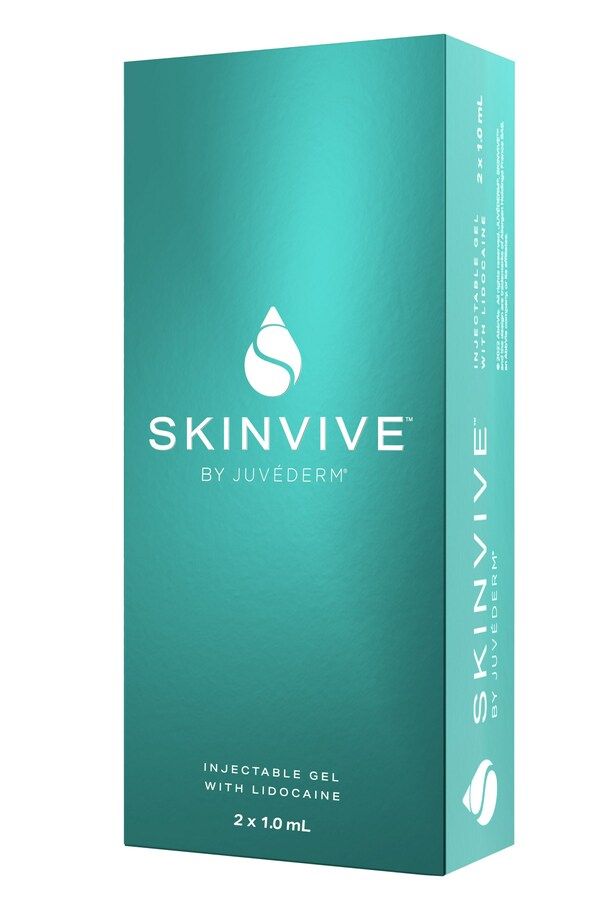- Acne
- Actinic Keratosis
- Aesthetics
- Alopecia
- Atopic Dermatitis
- Buy-and-Bill
- COVID-19
- Case-Based Roundtable
- Chronic Hand Eczema
- Chronic Spontaneous Urticaria
- Drug Watch
- Eczema
- General Dermatology
- Hidradenitis Suppurativa
- Melasma
- NP and PA
- Pediatric Dermatology
- Pigmentary Disorders
- Practice Management
- Precision Medicine and Biologics
- Prurigo Nodularis
- Psoriasis
- Psoriatic Arthritis
- Rare Disease
- Rosacea
- Skin Cancer
- Vitiligo
- Wound Care
Article
FDA Approves Skinvive by Juvederm for Improving Skin Smoothness
Author(s):
Previous research demonstrated the microdroplet injection’s ability to improve skin quality, smoothness, and overall hydration.
The US Food and Drug Administration (FDA) has approved Skinvive by Juvederm, the first hyaluronic acid intradermal microdroplet injection, for improving skin smoothness in adult patients ages 21 and older.
SKINVIVE, Courtesy of JUVEDERM, Allergan Aesthetics

Allergan Aesthetics, an AbbVie company, announced the approval in a press release.1 At this time, Skinvive is the first and only treatment of its kind. The injectable gel contains local anesthetic lidocaine and works to improve skin quality in patients’ cheeks through increasing hydration and smoothing the skin.
Furthermore, Skinvive was approved for use in all Fitzpatrick skin types, I through VI. Recent research has shown that patients with darker skin types and skin of color are generally excluded from clinical trial participation, including in cosmetic and aesthetic dermatology.
"Skin quality is among the top concerns my patients express when seeking aesthetic treatments. It's an extremely important factor I consider in my therapeutic process of restoring their natural beauty and appearance," said Macrene Alexiades, MD, PhD, in the press release. “One key way to improve skin quality is by enhancing hydration. Skinvive by Juvederm is truly innovative because it works beneath the skin's surface to increase skin hydration improving skin quality. I am excited to add this unique offering to my dermatologic treatment regimen for my patients."
Alexiades is a board-certified dermatologist in the US and European Union, as well as the lead investigator for Skinvive by Juvederm, and author of the published clinical study related to Skinvive’s efficacy and safety. The study was published in Dermatologic Surgery.
The clinical study, which was controlled, evaluator-blind, multicenter, and randomized, utilized the Allergan Cheek Smoothness Scale (ACSS) and a patient satisfaction skin questionnaire to determine study participants’ satisfaction with several factors, including resulting skin radiance, hydration, health, and more. The questionnaire was completed before and after receiving treatment.
One month after treatment, 58% of participants experienced a greater than 1 point improvement on the ACSS. Six months after treatment, 56% of participants met the same endpoint.
At baseline, 11% of participants were satisfied with their skin’s radiance. Six months after receiving treatment, this number rose to 63%. Further patient satisfaction outcomes include:
- Facial skin healthiness: 38% baseline satisfaction; 83% post-treatment satisfaction
- Facial skin hydration: 24% baseline satisfaction; 72% post-treatment satisfaction
- Facial skin refreshedness: 16% baseline satisfaction; 69% post-treatment satisfaction
Treatment-emergent adverse events were typically mild to moderate in nature, with the majority of study participants reporting bruising, discoloration, firmness, lumps/bumps, pain, redness, swelling, or tenderness at the injection site. Researchers also made note of needle abrasion and papules in some participants. Most of these side effects resolved within 30 days.
In Europe, researchers also conducted a post-marketing survey and found that use of Skinvive may result in changes to aquaporin levels. Allergan Aesthetics will be pursuing additional research to investigate Skinvive’s impact on hydration markers, according to the press release.
Allergan Aesthetics estimates that Skinvive by Juvederm will become commercially available within the next 6 months.
Reference
- AbbVie. SKINVIVE by JUVÉDERM Receives U.S. FDA approval. PR Newswire: press release distribution, targeting, monitoring and marketing. May 15, 2023. Accessed May 15, 2023. https://www.prnewswire.com/news-releases/skinvive-by-juvederm-receives-us-fda-approval-301824129.html.
Newsletter
Like what you’re reading? Subscribe to Dermatology Times for weekly updates on therapies, innovations, and real-world practice tips.














